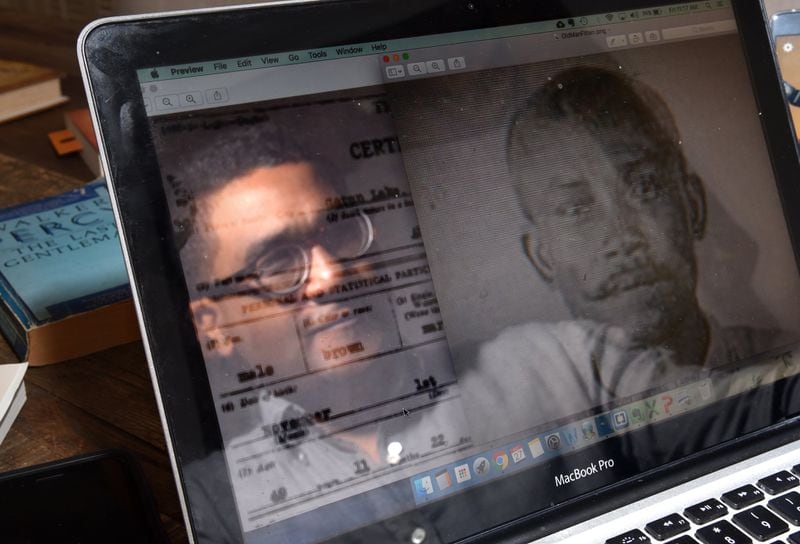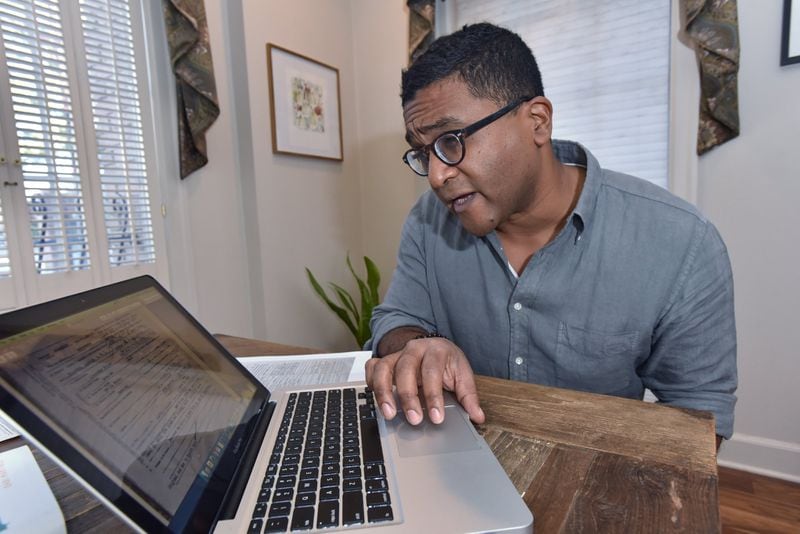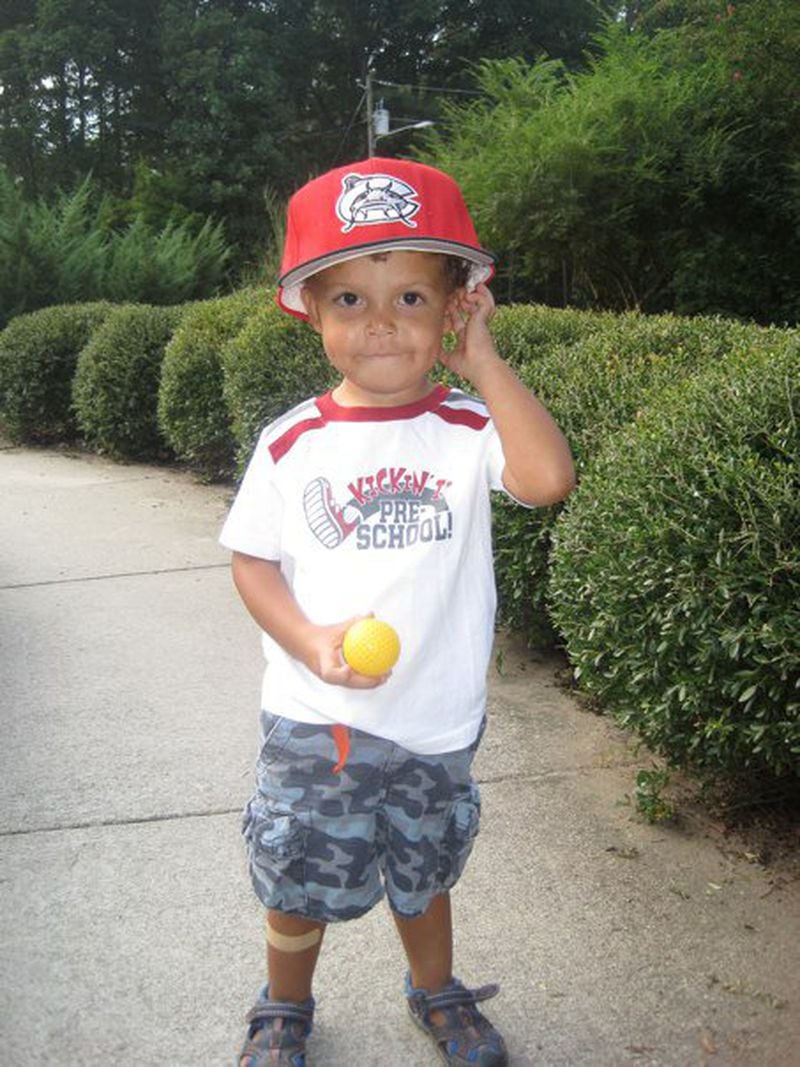My full legal name is Marc Jeffrie Fitten, but I have always disliked it. It’s like the skin tag hanging from my neck that I keep promising myself I will do something about.
Since I was 6, I have never been comfortable with hearing it spoken or saying it out loud. I have never identified with it. Ever since I was a child, everything in my DNA rejected this name. Probably because I instinctively knew it was a fake.
My real name is lost to my family and me. Lost for many reasons, but especially because along the way an ancestor realized his name gave away an ethnicity that was more trouble than it was worth. So he changed it. Twice. A shoemaker and a migrant who traveled around the Caribbean taking odd jobs, my half-Chinese great grandfather managed to hide his identity from the people around him and from his descendants for 100 years.
Credit: Hyosub Shin
Credit: Hyosub Shin
I imagine he did it to survive and gain advantages in life, but I believe his doing so left a family adrift — or at least it left me adrift. Ultimately, Marc Jeffrie Fitten’s identity has been as much a mystery to me as it has been to the people I interact with. On the surface, the name smacks of something practical and industrious — a mid-level bank clerk in a Dickens story — but really, it’s a complete mess. It’s misspelled, for starters. It also crams Latin, Germanic and WASPy influences into a grab bag of realities wholly at odds with itself.
Now, history tells me there was a Mary Fitton in Queen Elizabeth’s court — that she may have been Shakespeare’s “Dark Lady” — but this is only a coincidence. Wishful thinking. When I look in a mirror I don’t see Queen Elizabeth’s court staring back at me. I don’t see the fall of Rome. I don’t see a rising Germany. I don’t see Europe at all. When I look in a mirror I see a nut-brown face. I see slightly slanted eyes. I see thick, bushy hair. When I look in a mirror I catch a glimpse of the histories of many different peoples. All of them are more associated with the developing world than with high tea.
The simple fact is, regardless of who people think they see in Marc Jeffrie Fitten, what they don’t know is that for most of my life I have been a person without any family history — a person without context. My family history goes as far back as my family’s arrival in the United States in 1950. Everything prior to that is tall tales and speculation. There are no photographs. There are no facts. Until I started looking, there were not even full names. It is as if my family materialized out of the ether and was just suddenly living in the boroughs of New York City.
Credit: Hyosub Shin
Credit: Hyosub Shin
Here’s what I know for certain. In the late 19th century, to avoid being ostracized as an outsider who was taking away work from a local population — and to fit in with a black majority on the British isle of Jamaica — my half-Chinese great-grandfather changed his name to the very Anglican sounding Aubrey Townsend. He married a mulatto woman, moved with her to Panama, and then changed his name again to Alexander Fitten.
Those are both dashing names, I have to admit. Aspirational Edwardian identities — perfect for people living in a colored caste system in a British colony.
The twist is intriguing as well. While mixed-race African-Americans were passing as white in the United States, in the Caribbean, a Chinese Jamaican wanted to hide his name and ethnicity and for his children to pass as colored.
My great-grandfather — forever after known as Mr. Fitten — even had the good sense to die early, and so he took his secrets with him.
The most interesting thing about Mr. Fitten growing up was that he was a mythical character. His was almost a religious tale. For starters, nobody except for my grandfather and his siblings had actually met him, and they all seemed to hardly remember him. His death was horrific — he drowned in front of my grandfather on their way to deliver fruit to the United Fruit Company.
Understandably, my grandfather never spoke of him. Nobody ever described him. His life was reduced to a few rumors and the capsizing of his overloaded canoe.
So the cornerstone of our family — and Mr. Fitten had two very large families who were a secret to one another until long after his death — was a cipher. He had two wives with something like 12 children between them. Not a single one of them remembered that he was Chinese. When he died, his children went on with their lives, their brown skin and their Anglican name in Panama. He had managed to successfully hide his past and ethnicity, as well as that most basic element toward an identity — his surname. All 14 of his immediate family members — not to mention their numerous descendants — lost all knowledge of and access to their original name.
I would call that successfully passing. And ultimately, that’s what passing is: a person forging a new identity based on the fact that some identities have more unearned advantages than others, and the effects of that change on subsequent generations.
The tragedy for me in Mr. Fitten’s decision is the implicit admission that nobody in the history of his family — my family —in the entire history of humanity, is worth remembering. That is a huge statement! What the passer is actually saying is that throughout 10,000 years of human civilization, several thousand years of Chinese culture, a migration across half of the world, there is nothing worth carrying. Alexander Fitten’s original name didn’t matter. It was just better to reinvent himself.
For a long time I couldn’t decide if his choice was incredibly sad or incredibly hopeful.
We are all, of course, captains of our own destiny, and I would like to think that what he chose to do was brave. But his choice came with a price, and the price is simply decontextualization — abandonment in the cosmos, if you like. In the end, one man’s choice is a great-grandson’s existential dilemma.
Regardless of how I feel, the erasure is a powerful statement. Mr. Fitten didn’t have to change his name; he decided to. He was not an African slave without a choice in the matter. Mr. Fitten’s name did not have to be lost to history. He willingly gave it up on an island where it had been taken from so many others.
Why would a Chinese laborer make the choice to erase all the generations that came before him? According to the tales surrounding him, besides the story of his death, there is the story of the land he owned and protected with dogs. Thinking this might be a clue, I hired a genealogist in Jamaica to see if there was any way to unravel his mystery. When I mentioned that he owned land, she said it was considered a sign of accomplishment.
This made me consider that maybe his name change worked in the end. Did Mr. Fitten only win these spoils after he changed his name? Had he sought advantages and opportunities beyond his station that only an Anglicized name could fulfill?
While I can mull these questions over in my mind as much as I like, I never walked in his shoes, and I can’t judge. But it is my right to uncover any truth about my identity I can find. It is my right to hire a researcher if I need to, and to know what my name is and where it’s from. It is my right to further the construction of my self-made identity with facts.
My great-grandfather — Alexander Fitten, aka Aubrey Townsend — changed his name and hid his Chinese ethnicity for three generations. The Fittens got whatever privileges could be had with their new name and the erasure of their Chinese ancestry. They migrated to Panama, where my grandfather went on to win the weekly lottery. He used the winnings to buy more land and ultimately migrate to the United States. Everyone in the family knew that their name had been changed, but they didn’t realize that Mr. Fitten had a habit of changing names, and that the name they assumed was their original name was in fact just another false identity.
Being a Marc Jeffrie Townsend would be as ridiculous as being Marc Jeffrie Fitten. The fable was fun, though. For the century it lasted, the family was comfortable enough with being Fitten, and Mr. Fitten could have gotten away with it for another century except for the context he left behind in his descendants’ bloodstreams.
His genetics.
Credit: Contributed photo
Credit: Contributed photo
In 2010 — 100 years after he had first changed his name to Aubrey Townsend — I received a frantic call from my sister. My 2-year-old nephew had just been rushed to a children’s hospital, where he was being admitted with symptoms that were alarming, painful and potentially life threatening. We did not know it at the time, but Mr. Fitten’s manufactured identity was beginning to unravel.
Illnesses can be bacterial, viral, or genetic. Sometimes illnesses or infections can trigger genetic responses. As we know, Africans and African-Americans are known to have a predisposition to sickle-cell anemia, while Ashkenazi Jews are at high risk for Tay-Sachs disease.
“I don’t understand,” my sister kept repeating. “They keep asking me if I’m Asian.”
Asians, we eventually learned, are predisposed to a condition known as Kawasaki disease. What happens with Kawasaki disease is that the body’s immune system attacks the body itself. After a five-day fever, skin peels away from hands and feet. The lips, mouth, throat and tongue become desiccated. They crack and bleed and also begin to peel away. The whites of the eyes turn red and swollen. Lymph nodes swell, and finally, if the illness goes untreated or if there are complications, the blood vessels in the heart or any other major artery can bulge and cause an aneurysm.
It is an ugly-looking condition; my nephew looked as if someone had poured boiling water over him. Whereas I had always rejected my name, this kid was literally rejecting himself, and it all pointed to the inscrutable Alexander Fitten.
I remembered something a cousin had told me days earlier. I hadn’t responded to it at the time, but sitting there, I couldn’t stop thinking about it.
“Your father took a DNA test,” he’d said.
Until this moment in my life I believed that contexts were entirely speculative. At best, I thought, civilization was a hopeful hypothesis. At worst, it was an illusion. The only real things, as far as I could observe, were the precarious and existential crisis of the human condition, the capacity to love, the will to power, and the power of hope. We could call ourselves or be whatever we wanted.
That sentiment changed the moment I looked into the face of my sister’s sick kid. My sick kid. In that moment, I realized it mattered that Mr. Fitten changed his name and didn’t tell anybody. It mattered because in a split-second it went from not mattering to being the only thing that did matter. Had we known the truth, the moment the doctor asked my sister if she was Asian, she could have at least said, “A little bit.”
So I called my father and asked him if he took a DNA test.
“No,” he said.
“Did anybody come over and stick anything in your mouth or make you spit in a tube?”
He was quiet. “Is that what that was?”
“Yeah,” I said. “Have you gotten anything back?”
“There’s an envelope here.”
“Can you open it and read it to me?”
He opened the letter he had received two weeks before my nephew was admitted to the hospital. It had account information for the online DNA service his sisters had set up. He gave me the information, and after my nephew was in the clear and I left the hospital, I logged on and read the test results.
Mr. Fitten’s secret was completely exposed.
I called my sister to tell her the good news.
“You’re Chinese!” I said. “Enough, I guess, to catch Kawasaki disease. If they ask you again, now you can say yes. A little bit.”
Honestly, she didn’t really care. The strange thing about all of this is that I am the only person in my family this matters to.
I reject the name Marc Jeffrie Fitten because it is a lie and I know it’s a lie. I am living a grandparent’s lie. And I don’t want to do that. I have enough lies of my own I can sell myself. At the very least, I ought to have the stability of a name. That is why I have taken my own DNA test. This is why I am still working with a genealogist — why I have paid a professional to search government documents, church records, and deeds and peel back all the misinformation. I want to claim this lost identity. I want to know all of it. I want to know because this is my life and it is the fertilizer on which my psychological development rests, and who knows? One day I might end up on a gurney myself and the knowledge of who I am or where I’m from might be the only thing that saves my life.
Excerpted from “We Wear the Mask: 15 True Stories of Passing in America” edited by Brando Skyhorse and Lisa Page (Beacon Press, 2017). Reprinted with permission from Beacon Press.
ABOUT THE WRITER
Marc Fitten is the author of the novels "Valeria's Last Stand" and "Elza's Kitchen," which have been published in a half-dozen languages. A resident faculty member at the Yale Writers Conference, his essays have appeared in The New York Times, and The Atlanta Journal Constitution. He lives in Atlanta.
ABOUT THE STORY
This excerpted essay is featured in “We Wear the Mask” (Beacon Press), a collection of essays by 15 writers that examine what it means to pass as something other than oneself, be it a different race, a different gender, a different sexual orientation or just plain different from one’s authentic self. It is a thought-provoking look at identity and the ways we shape it.
Suzanne Van Atten
Personal Journeys editor
About the Author








